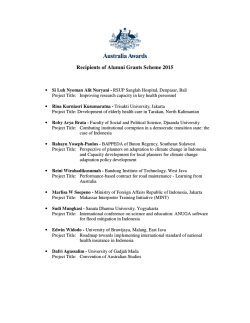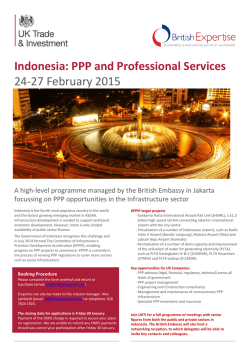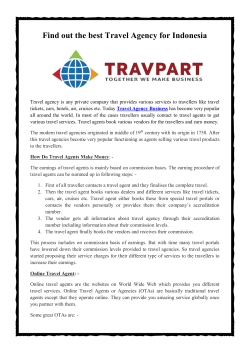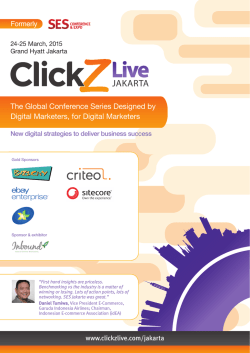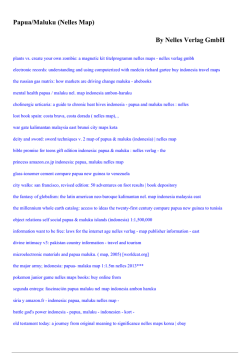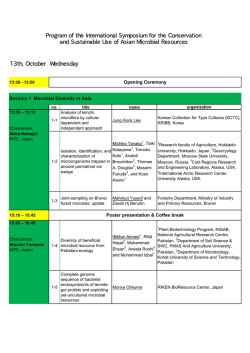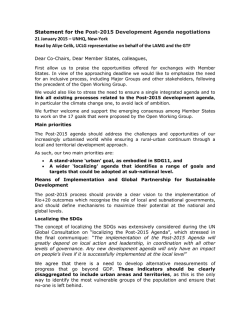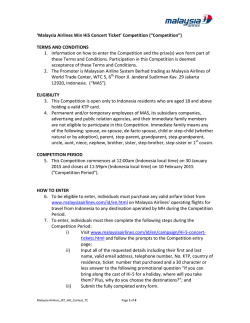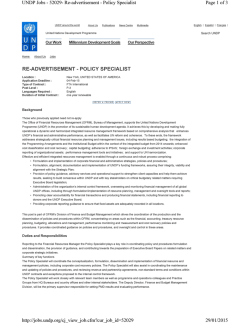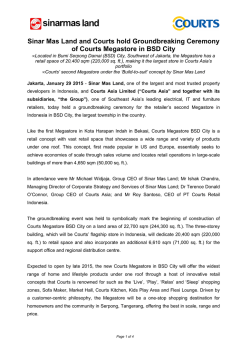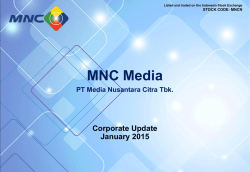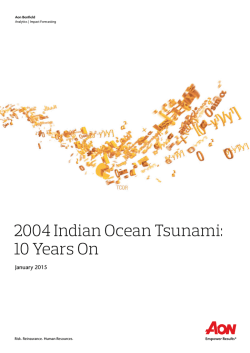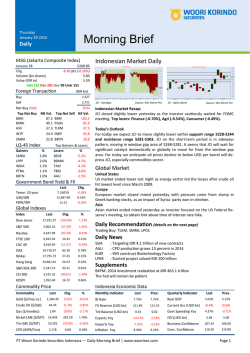
English - UN Indonesia
February 2015 UN IN INDONESIA Health and Happiness With the support of WHO, UNICEF and government partners, the ongoing Aceh immunization programme and infant development monitoring are protecting the next generation. UNCG Indonesia/Dru Maasepp 2015 Time for Global Action Jakarta | Enormous progress has been made towards achieving the Millennium Development Goals (MDGs). Global poverty continues to decline. More children than ever are attending primary school. Child deaths have dropped dramatically. Access to safe drinking water has been greatly expanded. Targeted investments in fighting malaria, AIDS and tuberculosis have saved millions. Dru Maasepp/UNCG Indonesia Here in Indonesia, the UN is fine-tuning the partnership with the Government on the framework agreement for 2016-2020 in support of Indonesia’s development goals. “An important part of our work will be to support Indonesia in implementing and measuring progress on the SDGs as the new development agenda come online,” says UN Resident Coordinator Douglas Broderick. But with the MDG agenda concluding at the end of 2015, world leaders have called for a new ambitious agenda to improve people’s lives and protect the planet for future generations. The UN’s work in Indonesia is an important part of its global efforts in collaboration with governments, civil society and other partners to build on the momentum generated by the MDGs and carry on with an ambitious post-2015 sustainable development agenda that is This post-2015 development agenda, referred to as the expected to be adopted by UN Member States at the Sustainable Development Goals (SDGs), is expected to Special Summit on Sustainable Development in tackle many issues, including ending poverty and September 2015. hunger, improving health and education, making cities more sustainable, combating climate change and protecting oceans and forests. “We are on the threshold of the most important year of development since the founding of the United Nations itself,” UN Secretary-General Ban Ki-moon said at the launch of his preliminary synthesis report on the SDGs in December, highlighting 2015 as “an historic opportunity and duty to act, boldly, vigorously and expeditiously, to turn reality into a life of dignity for all, leaving no one behind.” 1 2 2 3 3 1 2015: Time for Global Action The Road to Dignity by 2030 The UN Turns 70 Combating AIDS: Indonesia Recognised 1.8 Billion Youth: Opportunities and Challenges Read the Secretary-General's Synthesis Report 4 5 6 8 Aceh Tsunami 10 Years On UN Voices from the Tsunami: Kristanto Sinandang Open Defecation: Indonesia Steps up the Fight Looking Ahead Calendar UN IN INDONESIA February 2015 The Road to Dignity by 2030 Proposed Sustainable Development Goals Following more than a year of inclusive and intensive consultative deliberations, the Open Working Group of the General Assembly on Sustainable Development Goals proposed 17 specific goals with 169 associated targets. UN Member States have agreed that the agenda laid out by the Open Working Group will be the main basis for the post-2015 Sustainable Development Knowledge Platform: sustainabledevelopment.un.org GOAL 1 GOAL 2 GOAL 3 GOAL 4 GOAL 5 End poverty in all its forms everywhere End hunger, achieve food security and improved nutrition and promote sustainable agriculture Ensure healthy lives and promote well-being for all at all ages Ensure inclusive and equitable quality education and promote lifelong learning opportunities for all Achieve gender equality and empower all women and girls GOAL 6 GOAL 7 GOAL 8 GOAL 9 Ensure availability and sustainable management of water and sanitation for all Ensure access to affordable, reliable, sustainable and modern energy for all Promote sustained, inclusive and sustainable economic growth, full and productive employment and decent work for all Build resilient infrastructure, promote inclusive and sustainable industrialisation and foster innovation GOAL 10 GOAL 11 GOAL 12 GOAL 13 GOAL 14 Reduce inequality within and among countries Make cities and human settlements inclusive, safe, resilient and sustainable Ensure sustainable consumption and production patterns Take urgent action to combat climate change and its impacts Conserve and sustainably use the oceans, seas and marine resources for sustainable development GOAL 15 GOAL 16 GOAL 17 Protect, restore and promote sustainable use of terrestrial ecosystems, sustainably manage forests, combat desertification, and halt and reverse land degradation and halt biodiversity loss Promote peaceful and inclusive socities for sustainable development, provide access to justice for all and build effective, accountable and inclusive institutions at all levels Strengthen the means of implementation and revitalise the global partnership for sustainable development The UN turns 70 security and human rights work, a n d u l t i m a t e l y, u n i t e t h e inter national community in common cause to enable a strong UN to realize a better world. 70 years ago, on 24 October 1945, the UN Charter came into force and the United Nations came into being. This year, to celebrate its 70th anniversary, the UN will aim to honour the historic breadth of the Organization’s development, 2 intergovernmental process. The Secretary-General has proposed that six elements frame the SDGs: dignity, prosperity, justice, partnership, planet and people. In Indonesia, events will be held throughout the year that reaffirm the universal principles that the UN was founded on. UN in Indonesia will also pay tribute to the 70th anniversary by celebrating Indonesia’s role in the UN, and highlighting the success stories. UN IN INDONESIA February 2015 Combating AIDS Indonesia Recognised in Two Global Awards winners in this global award programme indicates that there is already substantial experience and capacity among community groups in Indonesia and that they have reached a level of maturity which is even recognised globally." Jakarta | An Indonesian network of drug-user groups is this year's recipient of the prestigious Red Ribbon Award, the world's leading prize for innovative and outstanding community work in response to the AIDS epidemic. Persaudaraan Korban Napza Indonesia (PKNI) is a leading national network representing 25 selforganised drug-user groups across the country. Winning in the category of human rights, the organisation's work addresses stigma, violence, discrimination and other human rights violations against people who use drugs in an effort to combat AIDS. "Community-based organisations have shown the world how to mobilise for change in the AIDS response and the Red Ribbon Award recognises their transformative achievements," said Cho Kah Sin, UNAIDS Country Director in Indonesia. "The selection of PKNI as one of the Red Ribbon A global panel of civil society representatives selected the finalists from a shortlist determined by regional panels, with more than 1,000 nominees. Each of the winning organisations received a $10,000 grant and were invited to participate in AIDS 2014. In another accolade, Indonesia's UN Cares team has won the 2014 UN Cares Award for its work in promoting HIV testing and the importance of knowing one's HIV status. Congratulating the winners, UN Secretary-General Ban Ki-moon highlighted the leading role that the UN plays in the effort to combat HIV/AIDS. "HIV/AIDS remains a hugely important issue for the United Nations, as it does the whole world," he said. "When I launched UN Cares in 2008, I wanted the United Nations to become a model workplace in its handling of this challenge. I remain determined that the organisation does everything it can to assist those with HIV." UN Cares is the UN system-wide workplace program on HIV/AIDS that ensures the United Nations practices what it preaches when it comes to reducing the impact of HIV in the workplace. The World’s 1.8 Billion Youth Opportunities and Challenges Jakarta | Developing countries with large youth populations could see their economies soar, provided they invest heavily in young people’s education and health and protect their rights, according to The State of World Population (SWOP) 2014, published by UNFPA, the United Nations Population Fund in November. “With the right policies and investments in human capital, countries can empower young people to drive economic and social development and boost per-capita incomes,” said Jose Ferraris, UNFPA Representative in Indonesia. (BKKBN) Chairperson Prof. Fasli Jalal says that the government is tailoring programs that equip the young with proper education and skills, awareness to stay healthy, knowledge for decision-making, as well as a wider opportunity to grow. “Making these investments in youth is the right thing to do. It is also smart, for many reasons. For example, investing in youth can enable developing countries to reap a demographic dividend, which can help reduce poverty and raise living standards,” added Jose Ferraris. Read the full report here: www.unfpa.org/swop National Board of Population and Family Planning 3 UN IN INDONESIA February 2015 Aceh Tsunami 10 Years On Indonesia Remembers Aceh | Thousands of people gathered at Blang Padang field in Banda Aceh on the ten-year anniversary of the 2004 tsunami, in a solemn ceremony to remember the devastation, and pay tribute to the survivors and relief and rehabilitation efforts. His words were echoed by Margareta Wahlström, head of the UN Office for Disaster Risk Reduction, who highlighted that since the disaster, the world has taken significant action to ensure it is better prepared against such disasters. Vice President Jusuf Kalla, who was also Vice President at the time (under former President Susilo Bambang Yudhoyono), stressed the importance of swift international relief efforts, including rapid delivery of aid, victims search and logistics distribution. “Since the Indian Ocean tsunami and the adoption of the Hyogo Framework for Action in 2005, there have been substantial changes in the global thinking regarding disaster risk reduction issues. The tsunami acted as a wake-up call and made us understand how vulnerable we are to hazards. We cannot avoid natural "Thousands of corpses were sprawled in this field,” hazards, but we know enough, to certainly, prevent said Mr Kalla. “There were feelings of confusion, them to become disasters," she said. shock, sorrow, fear and suffering. We prayed.” “The tsunami acted as a wake-up call and made us understand how vulnerable we are to hazards. We cannot avoid natural hazards, but we know enough, to certainly, prevent them to become disasters” Margareta Wahlström, Head of the UN Office for Disaster Risk Reduction (UNISDR) WFP/Rein Skullerud “It was impossible for the government to rehabilitate the impacted areas without international help. Within 10 days, we held a UN summit in Jakarta, and within hours of the summit, all had pledged US$5 billion to finance the rehabilitation and reconstruction process in Aceh,” he said, adding that the money was used to rebuild roads, hospitals, houses and mosques. In the aftermath of the tsunami, the UN played an important role in the emergency response, followed by strategic investment in the province’s long-term development based on the principle of “Building Back Better”. The ceremony also reflected on the valuable lessons learned from the devastation, which is particularly important for Indonesia given its frequent natural disasters. “There can’t be any bigger lesson than the loss of more than 100,000 people,” said Aceh Governor Zaini Abdullah. “It has laid the ground for the Aceh’s government’s programme on disaster risk reduction which is now included in our medium-term development plan." 4 WFP/Rein Skullerud “We now have more efficient early warning systems and better evacuation procedures in place. This is also greater understanding and awareness globally of the broad damage that disasters can inflict on our societies." Read more about the UN's role in the relief, recovery and rehabilitation of Aceh: unic-jakarta.org/aceh-10 UN IN INDONESIA February 2015 UN Voices from the Tsunami Q&A with UNDP’s Kristanto Sinandang When Aceh was hit by the tsunami in 2004, Kristanto Sinandang was working with UNDP in its Crisis Prevention and Recovery Unit on disaster management issues. He talks about what it was like on the ground in one of the biggest humanitarian relief operations in history. UNDP Indonesia UNDP is not a relief agency as such, so how did you end up in Aceh after the tsunami? Considering the huge impact from the disaster, UNDP decided not to be merely involved in the coordination sphere but also concentrate in the early recovery program. UNDP’s leader realized the importance of UNDP's presence in Aceh and appointed me to work there. My target in my first six months in Aceh was to establish and start a new temporary office in Aceh, and to coordinate support from the UNDP office in Jakarta. challenges appeared also in relation to personal matters with our personnel because we worked in difficult situations where we have to live in tents, requiring strong stamina and perfect health, and also where the security situation sometimes threatened us. Overall, what lessons were learnt during the recovery and reconstruction in Aceh? Aceh is one of the success stories where development assistance was given. The Indonesian government has established the Rehabilitation and Reconstruction Body, which can coordinate decision-making directly in Aceh. This kind of cooperation stimulated other countries to adopt the mechanism. We can also view that this as a lesson learned in disaster management where decision-making coordination is easier to be decided if there is a national coordination body. Indonesia also learned about social cohesiveness, where national natural disasters become the cornerstone of social cohesiveness of all actors involved. Conversely, for the UN itself it is a lesson learned in context of what kind of approaches are possible to disaster management matters. From the law point of view, the Aceh tsunami was used as momentum for UNDP to encourage the realization of disaster management law that had previously been discussed with Bakornas. What were some of the biggest challenges you faced? Challenges appeared mainly because of the situation in the region that caused hindrance in mobility. In fact, tension of the Aceh conflict at that time also affected the situation, so we could not freely move to respond to the situation and give direct assistance. Other “Indonesia also learned about social cohesiveness, where national natural disasters become the cornerstone of social cohesiveness of all actors involved.” Kristanto Sinandang, UNDP UNCG Indonesia/Dru Maasepp 5 UN IN INDONESIA February 2015 Open Defecation Indonesia Steps up the Fight Jakarta | Rock star and humanitarian activist Melanie Subono has joined UNICEF Indonesia in taking up the fight against open defecation with the Tinju Tinja (“Punch the Poo”) campaign, launched on World Toilet Day. Although more prevalent in rural areas, open defecation also happens in urban cities, with a recent report estimating that 18 million people living in urban areas in Indonesia still defecate in the open. Dr. Cronin also highlights that open defecation has wide reaching implications, even for those who do have access to adequate sanitation facilities. “Open defecation affects not only those who don’t have a toilet, but also those who do, as anyone can get ill from excreta in the environment,” he said. UNICEF Indonesia The campaign feeds into the Millenium Development Goals target to halve by 2015 the proportion of people without sustainable access to safe drinking water and basic sanitation, as well as the UN’s global drive to end open defecation by 2025. Globally, some 1.9 billion people have gained access to improved sanitation since 1990. However, progress has not kept up with population growth and the Millennium Development Goals target on sanitation is unlikely to be reached by 2015 at current rates of progress. Open defecation is linked to many preventable yet potentially deadly diseases such as diarrhoea and pneumonia – chief contributors to more than 370 deaths per day of children under five in Indonesia. Although progress is being made “The task is to create noise that makes the nation sit up, take notice of open defecation and join the efforts to make Indonesia tinja-free”, said Dr. Aidan Cronin, Chief of the Water, Sanitation and H y g i e n e p ro g r a m , U N I C E F Indonesia. A recent report published by UNICEF and the World Health Organization found that 55 million people in Indonesia practice open defecation, making it the second highest number in the world after India. 6 “Open defecation affects not only those who don’t have a toilet, but also those who do, as anyone can get ill from excreta in the environment” Dr. Aidan Cronin, Chief of the Water, Sanitation and Hygiene program, UNICEF Indonesia through on-ground efforts conducted by UNICEF and the Government of Indonesia, there is a strong need for active participation by the public at large - one of the reasons why Ms. Subono was motivated to get involved in the campaign. “The fight to eliminate open defecation, as well as to campaign for a healthy lifestyle for all, needs active participation by the public, especially young people who create trends and influence decision makers,” she said. To show your support, tweet with the hashtag #tinjutinja, or go to: www.tinjutinja.com UN IN INDONESIA February 2015 Looking Ahead Calendar February TBC 53rd Commission for Social Development, New York TBC World Women’s Report 2015, New York TBC Tools for Customizing IWRM Guidelines for Water Security in Asia and the Pacific: Challenges and Opportunities for HELP and Ecohydrology, Jakarta/Medan [UNESCO Jakarta] 2 High-Level Thematic Debate on the means of implementation for the post-2015 development agenda, New York 2-3 ECOSOC Youth Forum - Transitioning from MDGs to SDGs - Engaging Youth, New York 2-8 World Interfaith Harmony Week 4 World Cancer Day 4-5 Netexplo Forum 2015, Paris [UNESCO] 6 International Day of Zero Tolerance of Female Genital Mutilation 13 World Radio Day [UNESCO] 20 World Day of Social Justice 21 International Mother Language Day [UNESCO] 25-26 ASEAN-UN Workshop: Regional Dialogue II on Political-Security Cooperation: ‘ASEAN-UN Collaboration in Support of the ASEAN Institute for Peace and Reconciliation’, Nay Pyi Taw, Myanmar March 1 Zero Discrimination Day [UNAIDS] 2 High-level thematic debate on advancing gender equality and the empowerment of women in the post-2015 development agenda, New York 3 World Wildlife Day [CITES] 3 Launch of the annual report of the International Narcotics Control Board, London 3-6 Regional Workshop on Sustainability Science, Kuala Lumpur, Malaysia [UNESCO Jakarta, Universiti Kebangsaan Malaysia] 8 International Women’s Day 9-17 Commission on Narcotic Drugs, including UNGASS special segment, Vienna 9-20 59th session of the Commission on the Status of Women: 20 Year Review of the Beijing Platform for Action, New York [UN Women] 10 Beijing+20 Commemoration Event [UN Women] 12-19 United Nations Crime Congress, Qatar 14-18 Third United Nations World Conference on Disaster Risk Reduction, Sendai City, Japan [UNISDR] 7 15 International Day of Families 18-22 Commission on Crime Prevention and Criminal Justice, Vienna 21 International Day of Forests and the Tree 22 World Water Day 23 World Meteorological Day [WMO] 24 World Tuberculosis Day [WHO] 24 International Day for the Right to the Truth concerning Gross Human Rights Violations and for the Dignity of Victims 24 International Day of Solidarity with Detained and Missing Staff Members 25 World Malaria Day 25 International Day of Remembrance of the Victims of Slavery and the Transatlantic Slave Trade [UNESCO] UN IN INDONESIA February 2015 Looking Ahead Calendar Key 2015 Dates 18 Apr 60th anniversary of the Asian-African Bandung Conference 23 May Commemoration of Indonesia's Membership in WHO TBC Jun Asia-Pacific Regional Conference on Peacekeeping, TBC, Indonesia TBC Jul MDG Report 2015 launch, New York 1-6 Aug ASEAN Foreign Ministers Meeting, ARF and East Asia Summit Meetings, Malaysia 25-27 Sep Summit at HoSG level for the adoption of the post-2015 development agenda; planning and co-branding with UN70, New York 24 Oct United Nations Day 30 Nov 21st Conference of the Parties (COP21) of the UN Framework Convention on Climate Change "Today, we have more than 805 million people facing hunger and malnutrition. Population growth will require an approximately increase of 60 percent in food production. As so much of our food depends on soils, it is easy to understand how important it is to keep them healthy and productive," said FAO Director-General José Graziano da Silva. The UN has declared 2015 the International Year of Soils in an effort to highlight the need for healthy soil, which forms the foundation of our food, fuel, fibre and medical products, as well as being essential to our ecosystems, the carbon cycle, storing and filtering water, and improving resilience to floods and droughts. Around the world today, global soil resources are facing severe degradation, with the human impact on soil going as far as to eliminate essential soil functions in some cases. The entire United Nations community is encouraged to take positive action to help further the cause for soils, and sustainable development, in 2015. The views expressed in this publication do not necessarily reflect the official views or policies of the United Nations. The information herein may be freely reproduced. UN IN INDONESIA is published electronically by the United Nations Information Centre, Jakarta. Email: [email protected] 8
© Copyright 2026
